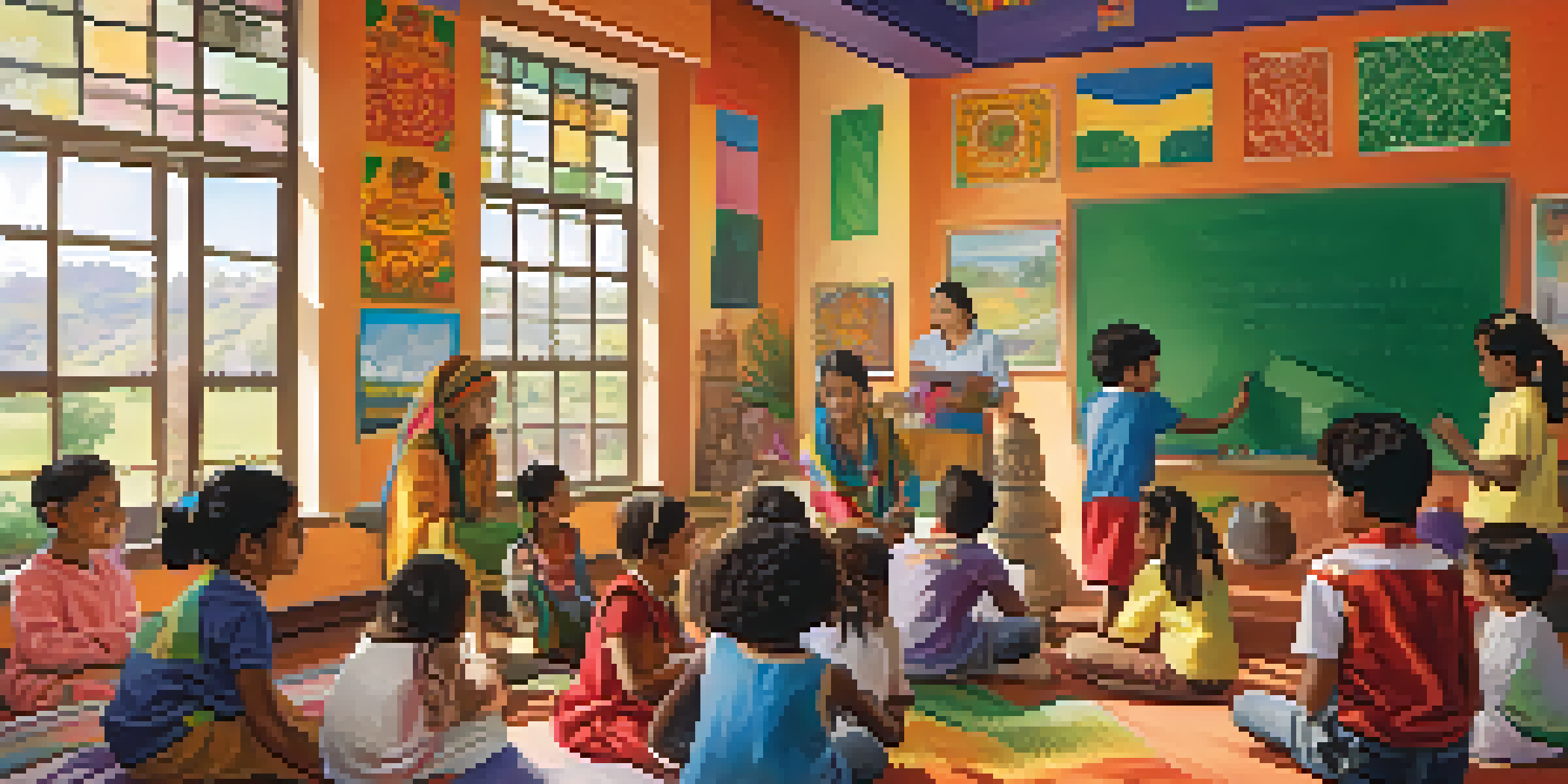Exploring Cultural Awareness: A Key to Global Understanding

Understanding Cultural Awareness and Its Importance
Cultural awareness refers to recognizing and respecting the diverse cultural backgrounds that shape individuals' perspectives and behaviors. In our increasingly interconnected world, understanding these differences is essential for effective communication and collaboration. It helps us navigate social interactions more thoughtfully, fostering an environment of empathy and inclusivity.
Culture is the widening of the mind and of the spirit.
When we engage with different cultures, we open ourselves to a wealth of experiences and viewpoints. For instance, a simple meal shared among friends from different backgrounds can lead to conversations that reveal unique traditions and values. This exchange not only enriches our understanding but also builds stronger relationships among diverse groups.
Ultimately, cultural awareness acts as a bridge that connects people across borders, promoting global understanding. By embracing this awareness, we can break down stereotypes and challenge biases, leading to a more harmonious coexistence in our multicultural societies.
The Role of Education in Promoting Cultural Awareness
Education plays a pivotal role in cultivating cultural awareness from an early age. Schools can introduce students to various cultures through curricula that include literature, history, and art from around the world. This exposure not only broadens their horizons but also instills a sense of curiosity about the diverse experiences of others.

For example, a classroom project that celebrates different cultural festivals allows students to actively engage with traditions beyond their own. Such hands-on experiences can spark discussions that help children develop critical thinking skills and a deep appreciation for diversity. When children learn about the values and customs of their peers, they are more likely to form friendships that transcend cultural divides.
Cultural Awareness Enhances Empathy
Understanding diverse cultures fosters empathy and inclusivity in our interactions.
Moreover, educational institutions can partner with local communities to create cultural exchange programs. These initiatives encourage students to step outside their comfort zones and interact with individuals from different backgrounds, further enhancing their understanding and acceptance of diversity.
Traveling as a Tool for Cultural Awareness
Traveling to different countries offers an unparalleled opportunity to immerse ourselves in diverse cultures. It’s not just about sightseeing; it’s about experiencing how people live, work, and celebrate their traditions. This firsthand experience can profoundly alter our perspectives and challenge preconceived notions.
The beauty of the world lies in the diversity of its people.
For instance, visiting a local market in a foreign city can reveal much about its culture—from the food they eat to the way they interact with one another. Engaging with locals during travels allows for authentic connections that textbooks simply cannot provide. These interactions can lead to meaningful insights that enrich our understanding of global communities.
However, it’s essential to approach travel with an open mind and a willingness to learn. Being respectful of local customs and traditions can enhance our travel experiences and foster positive relationships with the people we meet along the way.
Listening to Diverse Voices and Perspectives
One of the most effective ways to enhance cultural awareness is by actively listening to the stories and experiences of others. Engaging in conversations with people from various backgrounds allows us to gain insights into their lives and the challenges they face. This practice not only promotes empathy but also fosters a deeper understanding of the cultural complexities that shape our world.
For instance, participating in community discussions or forums that focus on cultural issues can provide a platform for marginalized voices to be heard. By giving space for these narratives, we acknowledge the richness of human experience, which can inspire us to become advocates for social change.
Education Cultivates Cultural Understanding
Integrating cultural studies in education helps students appreciate diversity from an early age.
Moreover, consuming diverse media—such as films, books, and podcasts—can broaden our perspectives. By exploring stories that differ from our own, we can challenge our biases and expand our empathy towards others.
The Impact of Technology on Cultural Awareness
In today's digital age, technology has revolutionized how we connect and learn about different cultures. Social media platforms allow for the rapid sharing of cultural content, making it easier than ever to engage with diverse perspectives. This connectivity can foster a sense of global community and encourage cultural exchange.
For instance, platforms like Instagram and TikTok feature creators from all over the world showcasing their cultures through art, food, and traditions. Such content can pique our interest and inspire us to explore cultures we may have previously overlooked. The visual and interactive nature of these platforms can make cultural learning more engaging and accessible.
However, it’s crucial to approach online content critically. While technology can enhance our understanding, it can also perpetuate stereotypes if not consumed mindfully. Therefore, it’s important to seek authentic sources and diverse voices to truly benefit from the wealth of information available online.
Overcoming Cultural Barriers through Awareness
Cultural barriers often stem from misunderstandings or lack of knowledge about different practices and beliefs. By fostering cultural awareness, we can break down these barriers and create more inclusive environments. This process involves recognizing our own biases and being willing to learn from others.
For example, in the workplace, cultural awareness training can help employees understand their colleagues' backgrounds, leading to improved collaboration and teamwork. When team members feel respected and valued for their unique contributions, it enhances productivity and job satisfaction.
Travel Broadens Cultural Perspectives
Experiencing different cultures firsthand through travel deepens our understanding and challenges stereotypes.
Additionally, promoting cultural awareness in social settings can lead to more meaningful interactions. Being open to learning from others’ experiences allows us to embrace diversity and cultivate a sense of belonging for everyone involved.
The Future of Cultural Awareness in a Globalized World
As globalization continues to shape our societies, the importance of cultural awareness is more relevant than ever. In a world where boundaries are increasingly blurred, understanding and respecting cultural differences will become critical for peaceful coexistence. Our ability to navigate these complexities will define our collective future.
Educators, travelers, and individuals alike have a role to play in fostering cultural awareness. By prioritizing empathy, active listening, and open-mindedness, we can contribute to a global culture that celebrates diversity rather than fearing it. This shift in mindset can pave the way for more inclusive communities around the world.

Ultimately, embracing cultural awareness is not just about understanding others; it's about enriching our own lives. By learning from diverse cultures, we can grow personally and collectively, leading to a brighter, more harmonious future.